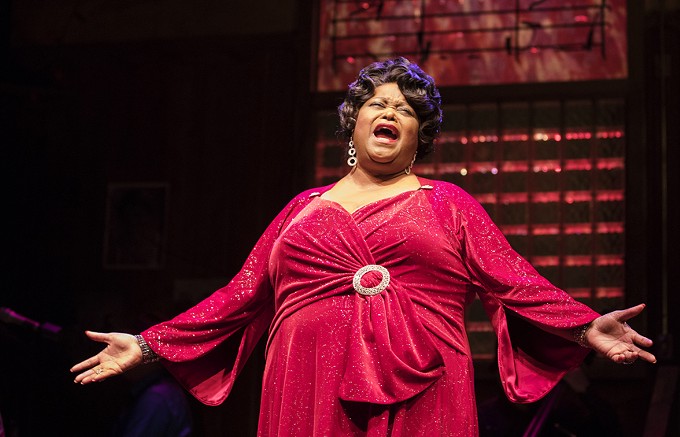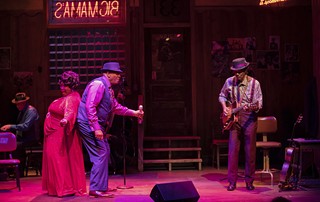It's raunchy and raucous. Bawdy and bluesy. Misery made music, and, yeah, the good times too. It's damn fine entertainment, no way around it.
This is Arizona Theatre Company's Low Down Dirty Blues, which shakes the worry and stress right out of us like you'd shake the dirt out of a throw rug.
But is it theater? Does it matter?
This is not a play. It's a concert with intentions, rather thoughtfully put together as those of a play would be.
And frankly, I'd rather have a concert than a woefully contrived story to showcase what's really the star of this staging, which is the music and those who make it.
So get your expectations straight and sit back and be prepared to be blown away.
The concert was born in Chicago, birthed by Randal Myler and Dan Wheetman, and directed by Myler, both ATC veterans. The convention of the staging is that this is after hours in a Chicago blues joint called Big Mama's. Vicki Smith's set provides the interior of the bar, lit by Don Darnutzer, and puts us right there. Down in front, some audience members sit at stage-side tables, cabaret style. The idea is that everybody's gone except the musicians and Big Mama herself, decked out in a glorious red dress that glitters and glows, and they hang out and share stories and songs. That's about it as far as story is concerned, and this itself is so contrived (and inconsistent, since there are those tables down front), it foreshadows how horribly contrived an additional story set onto the proceedings would be. So the dramatist shuts up and lets the good times roll.
And those good times, particularly in the first act, often involve the kind of good times everybody can afford. You know what I'm talkin' about. Mama (Felicia P. Fields) starts the night off with, appropriately enough, "They Call Me Big Mama," accompanied by guitar playing Jelly (Chic Street Man); keyboard playing Steve Schmidt and bassist Calvin Jones, who rock it all night long.
It doesn't take long until things start to heat up.
This Big Mama is based loosely on Willie Mae "Big Mama" Thornton, who was the first to record "Hound Dog." There's a bit of biography interspersed in the evening, like being a preacher's kid ("PK") and singing in the choir on Sunday after singing at barroom gatherings Saturday night. But that was true for a lot of folks.
This Big Mama—I'll just refer to her by her real name, Fields—is a large round woman with a throaty, meaty voice. She rattles us immediately and then seduces us shamelessly with "Rough and Ready Man." And when Chic begins "Crawlin' King Snake," the temperature rises and our faces become flushed. Fields joins in, and, oh my, this is not just sexual innuendo; this is sex in song.
And off we go. Chic launches into "Come On in My Kitchen," and Fields responds with "My Stove's in Good Condition." And on it goes. Shake Anderson strolls in and ups the ante even more with "Born Under a Bad Sign," and all get it goin' with "Rub My Back." Whew.
The first act of the concert is good natured but raunchy, perhaps even a bit too much of a good thing. But the tone of second act is more soulful, sorrowful, even. Anderson's woeful, excruciatingly heartbreaking "Death Letter" by Eddie Son House is almost too intimate. But the songs show us a sweet sorrow, while there are still plenty tunes to keep the joint jumpin'.
Fields is a Tony Award nominated actress for her work in The Color Purple, and the entire ensemble has impressive and extensive resumes, rooted deeply in the blues tradition, but certainly not limited to that genre. There's nothing fake here; these guys know what they're doing.
In both acts, Fields ventures from the stage into the front row, teasing the menfolk, flirting with them as she croons and fingers their mostly bald heads (that was the case on opening night, at least.) In the second act, taking a convenient chance to establish an intimacy for the songs to come, she worked these folks again, going from table to table, asking questions of the couples, often getting surprising answers that provided us with plenty of laughs. (Hint: if you happen to sit down front, come prepared to confess how many years you have been partnered or married or dating or whatever.)
One thing I found strange, and that really comes from ATC itself. The performers mention that it's necessary to sing these songs and celebrate the many players in this genre so that the history will not be lost. Yet we get the play list as a program insert, and the songwriters' names are not listed. These are songs by blues greats John Lee Hooker, Muddy Waters, Ma Rainey, Howlin' Wolf and the like. It seems more than a bit odd that this info isn't provided.
So, I warn you, if you're not a fan of the blues, and have no desire to make yourself otherwise, don't go. Because for two hours it will be assumed that you are. There's no proselytizing; you either is or you ain't.
But whatever your proclivities, if you can get a ticket you will be part of the real deal—some of the greatest blues songs there ever was performed by some real-deal singers and musicians.









